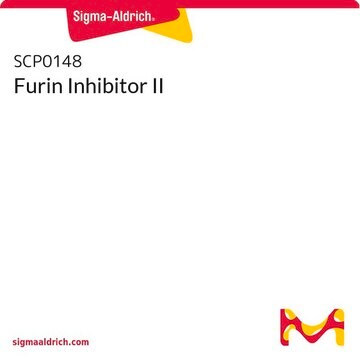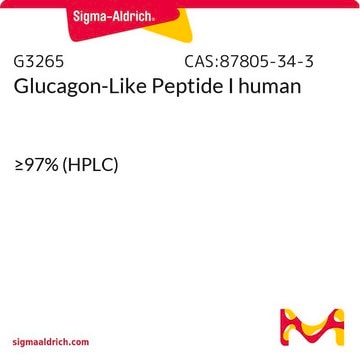SCP0042
[Gly35]-Amyloid β 25-35
≥95% (HPLC)
Iniciar sesiónpara Ver la Fijación de precios por contrato y de la organización
About This Item
Fórmula empírica (notación de Hill):
C42H75N13O12
Peso molecular:
954.12
UNSPSC Code:
12352209
NACRES:
NA.32
Productos recomendados
assay
≥95% (HPLC)
form
lyophilized
composition
Peptide Content, ≥70%
storage condition
protect from light
storage temp.
−20°C
Amino Acid Sequence
Gly-Ser-Asn-Lys-Gly-Ala-Ile-Ile-Gly-Leu-Gly
Application
Amyloid β (Aβ) refers to peptides derived from Amyloid precursor protein that vary in length from 36-43 amino acids. Aβ(s) peptides, their peptide fragments and mutated fragments are used to study a wide range of metabolic and regulatory functions including activation of kinases, regulation of cholesterol transport; function as a transcription factor, and regulators of inflammation. Aβ(s) peptides and their peptide fragments are also used to study oxidative stress and mechanisms of protein cross-linking in the context of diseases such as Alzheimer′s disease and neurodegeneration.
Storage Class
11 - Combustible Solids
wgk_germany
WGK 1
flash_point_f
Not applicable
flash_point_c
Not applicable
Certificados de análisis (COA)
Busque Certificados de análisis (COA) introduciendo el número de lote del producto. Los números de lote se encuentran en la etiqueta del producto después de las palabras «Lot» o «Batch»
¿Ya tiene este producto?
Encuentre la documentación para los productos que ha comprado recientemente en la Biblioteca de documentos.
Houttuyniae Herba protects rat primary cortical cells from Aμ25-35-induced neurotoxicity via regulation of calcium influx and mitochondria-mediated apoptosis.
Park H, Oh MS.
Human & Experimental Toxicology (2012)
L Millucci et al.
Current protein & peptide science, 11(1), 54-67 (2010-03-06)
Amyloid-beta (Abeta) peptide is commonly found in human Alzheimer's disease (AD) brain and is the main component of Alzheimer amyloid plaques. The predominant forms of Abeta in the human brain are Abeta(1-40) and Abeta(1-42), but Abeta(25-35) fragment, physiologically present in
Yan-Fang Xian et al.
Cellular and molecular neurobiology, 32(3), 353-360 (2011-11-02)
Beta-amyloid peptide (Aβ), a major protein component of senile plaques, has been considered as a critical cause in the pathogenesis of Alzheimer's disease (AD). Modulation of the Aβ-induced neurotoxicity has emerged as a possible therapeutic approach to ameliorate the onset
Min Young Um et al.
Neurochemical research, 37(4), 689-699 (2011-12-08)
We have investigated the neuroprotective effect of sesaminol glucosides (SG) in SK-N-SH cells. SG prevented apoptotic cell death induced by Aβ₂₅₋₃₅. In parallel, SK-N-SH cells exposed to Aβ₂₅₋₃₅ underwent oxidative stress as shown by the elevated level of intracellular ROS
Nuestro equipo de científicos tiene experiencia en todas las áreas de investigación: Ciencias de la vida, Ciencia de los materiales, Síntesis química, Cromatografía, Analítica y muchas otras.
Póngase en contacto con el Servicio técnico![[Ala28]-Amyloid β 25-35 ≥95% (HPLC)](/deepweb/assets/sigmaaldrich/product/images/306/938/dd9f7c72-cfca-4ea3-8e10-a7a2a7994639/640/dd9f7c72-cfca-4ea3-8e10-a7a2a7994639.jpg)








![[Gln22]-Amyloid β 1-40 human ≥95% (HPLC)](/deepweb/assets/sigmaaldrich/product/images/707/874/59f84b84-17c2-494f-b2ae-4ca860b83976/640/59f84b84-17c2-494f-b2ae-4ca860b83976.jpg)